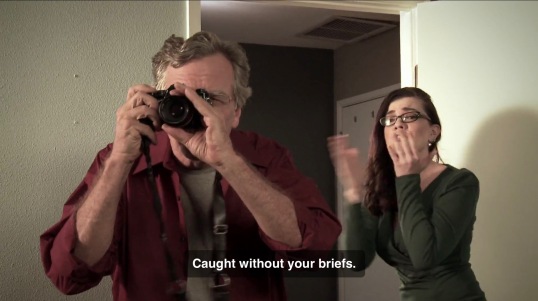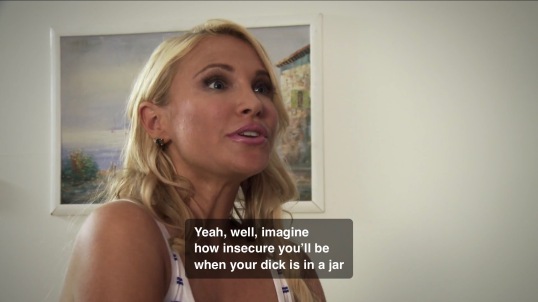It’s funny, but according to IMDb this movie isn’t going to premiere until January 24th of this year. That must be huge news for Cinemax who had this in their app, which is where I watched it.
That title made me think I was in store for something like Bikini Avengers (2015), which funny enough has some of the same actors in it. Also, that title card does in no way tell you the kind of film you about to watch. Here’s a song that I think does a fine job of telling you what kind of movie this is. That being Alice Cooper’s Elected.
Yep, it’s a parody of pop culture and politics. And it’s actually pretty good.
I knew I was in for something decent when the movie opened with several shots like the one above. It meant someone was going to bother to add a little style and therefore probably actually have a story.
It begins when a woman named Augustine (Katie Morgan) walks into a bar and proceeds to try and seduce a politician named Bill (Eric Masterson). She’s certainly pretty. She’s definitely caught his eye. However, something just isn’t right. When he asks her if he can buy her a drink, she says:
After he tells her he needs to be careful being a politician and all she says:
She says it must have been a program glitch. Don’t know about you, but that’s all the proof I need. She’s hot. Augustine and Bill leave and go to have sex. They seem to be having a good time till…
Then her eyes light up and…
That’s when we cut to a lab where we see a guy in a tie and a guy in a lab coat looking at a monitor showing what the obvious robot…bikini model robot, as she is called, sees. No time for that though because we need to meet our leading lady!
Don’t you love that I felt I needed to crop the title card to keep us from getting in trouble, but his breasts are perfectly G-Rated? Anyways, that’s Megan (Jacqui Holland). She’s canvassing the area to make sure people know to vote for Senator G.W. Bushwacker (Andy Espinoza Long) in his gubernatorial bid. Seeing as he’s got time to kill waiting for the cable guy, he agrees to hear her out. Clearly we need to hear about his positions. Policy positions as she corrects him.
She says that “unlike the other candidates in this race, Senator Bushwacker refuses to go negative.” That’s a load off my mind. I mean as she goes on to say “he could point out that Mayor Jefferson beats his wife, and he’s embezzled millions from the state treasury. And Sterling, well, he got his law degree from a Crackerjack box. And he has a hard drive filled with child pornography, not to mention his involvement in the kidnapping of the Lindbergh baby — but he won’t.”
Phew! Good thing Bushwacker doesn’t throw around wild claims. This guy though, he’s skeptical and asks why he should believe what she says. Isn’t it obvious? Those things are in the “talking points” they gave her to take around while knocking on people’s doors. He concedes that those things may be in the talking points, but what’s in it for him. The wheels start turning in her head and she suggests higher wages. Boy this guy is a tough sell though cause he’s “still on the fence.” How about “lower taxes”, she says. “Warmer”, he replies. Then she has a moment of revelation: “How about the government keeping its stinking hands off your Medicare?” Course he’s a young guy so Medicare isn’t really an important issue for him. At this point she says “the choice is clear. It’s either the wife-beating embezzler, the pedophile kidnapper who passes himself off as a lawyer, or Senator G.W. Bushwacker, a true American patriot.” Oh, and then she remembers: “Did I mention you can keep your guns?”
I feel for this guy. I mean lower taxes sounds good. I don’t really have to worry about Medicare at this point, but it’s nice to know he’ll stand up for the elderly. Bushwacker is running a no negative campaign. Plus, he does’t beat his wife, embezzle money, isn’t a pedophile kidnapper, doesn’t pass himself off as a doctor…I mean a lawyer, and he’s a true American patriot. Clearly there is one more thing I know I would certainly need to ask before giving Bushwacker my vote.
I wish I could show you the look actress Jacqui Holland gets on her face as she reluctantly pulls up her top. It’s great! By the way, it’s her film. She steals the show. No sex scene happens though because we have more important things to attend to. We cut to the lab and find out that Bushwacker is working with a doctor to create bikini model robots to embarrass Bushwacker’s opponents. He wants robots so they can’t turn on him later like real women could. Makes sense.
Now we cut to Megan at home with her boyfriend. Megan is kind of broken up. She said, “I could barely even look at myself.” He tries to comfort her, but he clearly just doesn’t understand. She was talking about her most recent Facebook post of course! I mean it only got six likes. What the hell! Maybe some people just didn’t see the dress right.
I can’t say I expected that to come back around again. Regardless, he finds it weird that it’s that which has her broken up and not her taking her top off. Men! “Country first, babe. It was my patriotic duty.” A damn fine American. Oh, and they have sex.
Meanwhile, back in the lab they have made a new bikini model robot and they send her off to go after that lawyer. She says that she is being sexually discriminated against at her job. By that she doesn’t mean that anyone there won’t have sex with her. They’re not that discriminating. They just don’t want her wearing sexy clothes. She works at a retirement center after all. But the lawyer is not easily convinced. He needs to see exactly what happened. Apparently, some guy had a heart attack after she bent over. So she bends her breasts towards his face. He’s a good lawyer though. He says, “He’ll leave no stone unturned.” That means we need to make sure she didn’t bend over in the other direction.
Poor actor Ryan Driller, if he’s not murdered like in Carnal Wishes, then they just shove a butt in his face. Of course they have sex till the photographer shows up.
Over at the campaign headquarters Megan gets to meet G.W. Bushwacker himself. And by that, I mean he tells her to take her clothes off and they have sex. And by they have sex, I mean it’s all in his head. But we do get another great Jacqui Holland facial expression!
Bushwacker invites her and the boyfriend out for drinks. Back in lab, the good scientist (Ted Newsom) makes sure his two bikini models are fully functional. I mean he makes them have sex with each other. At first they are hesitant because they are both girls, but they soon get into it just fine. During this we see a board that tells us bikini stands for Binary Instillation Kinetic Integration Naissant Intelligence. In other words, bullshit. Also, the scientist completely goes away during this scene just in case we weren’t sure that this scene is meant to both be for voyeurs of girl on girl and for people who swap themselves out for one of the girls. Now one of the dumbest things I have ever seen a movie do happens.
Let me explain what’s going on in that shot. The couple at the table are in the foreground, in focus, and are moving their mouths as if they are talking, but no sound whatsoever comes out of their mouths. All the sounds are coming from the guy in the background talking on his cellphone and to the bartender. And this goes on for awhile too. It took me some time to realize what was happening here. It’s not till he walks over to the table that the sound makes sense again. Wow!
One drink leads to another, then another, and Megan decides to ask Bushwacker about gay marriage. They drink to it with “bottoms up”. She says the talking points still say that Mayor Jefferson beats his wife, although he apparently has stopped, but now it also has the new information that he killed a guy. She also calls him on his bullshit about saying other politicians flip flop, but that when he does it he says he has simply “evolved”. According to Bushwacker: “He calls it like he sees it. Until he sees it differently.” Now the boyfriend gets up to take a bathroom break (clearly he’s not presidential material). In there he is ambushed by the two bikini models. Bushwacker then takes her to that bathroom.
That’s brilliant! Clearly somebody should have tried that during one of the debates. On the upside, at least we know Bushwacker will not be passing bathroom laws anytime soon seeing as he clearly doesn’t have a problem with men and women using the same public bathroom.
The next day the boyfriend has some explaining to do! Unfortunately for him, she’s seen the 1974 gay porn called Drive.
We cut back to the lab to find out the lawyer thing barely got a blurb in the paper before cutting back to Megan so we can get this line.
Actually, the movie Bad Johnson (2014) taught me that you just pee out your butthole when that happens. Also, 22 Jump Street (2014) taught us that they will just carve out a vagina for you. There’s plenty of ways to deal with peeing without a penis. Luckily for him, she does let him keep it. That’s when the robots show up before cutting to the lab.
Bushwacker doesn’t believe that his opponents will fall for the bikini models again. The scientist responds with, “Hmm, fool me once, shame on me, fool me twice, can’t get fooled again.” Bushwacker responds with, “I couldn’t have said it better myself.” This is the greatest part of the movie for me. Remember when G.W. Bush ran for president the first time? Remember one of his campaign songs? It was Won’t Get Fooled Again by The Who.
I remember very clearly because as soon as the news story talking about it ended, and it went back to the anchors, they immediately brought up that it was odd he was using it considering the song ends with the line: “Meet the new boss. Same as the old boss.”
Now Megan and the bikini models show up at the lab and lead Bushwacker to believe they are on his side. They even have an orgy with him. But then…
However, it doesn’t mean the scientist is off the hook. He did kind of make all this nastiness possible. His response is that “we all have our little peccadilloes.” Or as he puts it succinctly, he gets his kicks from “schadenfreude”. Cue sirens and Megan says: “I think I hear your ride now.”
This is the kind of late night cable movie I love. If you are looking for one of these movies to check out, then just like Carnal Wishes, I recommend this one. Heck, I think I recommend this one even more. At least of the ones in the Cinemax app.



























